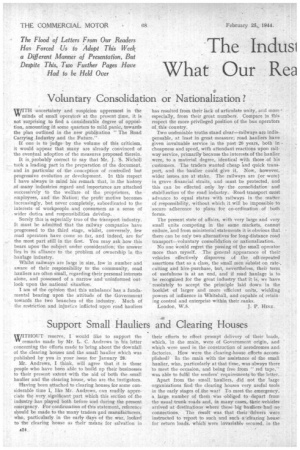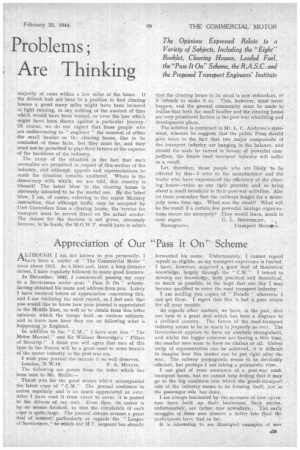The Indusi Problems; What Our Rea Are Thinking
Page 26

Page 27

If you've noticed an error in this article please click here to report it so we can fix it.
Voluntary Consolidation or Nationalization?
WITH uncertainty and suspicion uppermost in the Vv minds of small operators at the present time, it is not surprising to find a considerable degree of opposition, amounting in some quarters to mild panic, towards the plan outlined in the new publitation 'The Road Carrying Industry and the Future."
If one is to judge by the volume of this criticism, it would appear that many are already convinced of the eventual adoption of the measures proposed therein.
It is, probably correct to say that• Mr. j. S. Nicholl took a leading part in the preparation of the document, and in particular of the conception of controlled but progressive evolution or development. In this respect I have always in mind his remark that, in the history of many industries regard and importance are attached successively to the welfare of the proprietors, the employees, and the Nation; the profit motive becomes increasingly, but never completely', subordinated to the interests of workpeople and consumers as a sense of . wider duties and responsibilities deleelop.
Surely this is especially true of the transport industry. It must be admitted that the railway companies have progressed to the third stage, whilst, conversely, few road operators have come so far, and indeed, are for the most part still in the first. You may ask how this bears upon the subject under consideration; the answer lies in its alliance to the problem of ownership in the haulage industry.
Whilst railways are large in size, few in number and aware of their responsibility tothe community, road hauliers are often small, regarding their personal interests alone, and possessed of a narrow and uninformed outlook upon the national situation.
I am of the opinion that this unbalance has a fundamental bearing upon the attitude of the Government towards the two branches of the industry. Much of the restriction and injustice inflicted upon road hauliers has resulted from their lack of articulate unity, and more 'especially, from their great numbers. Compare in this respect the more privileged position of the bus operators of. this country. Two undeniable truths stand clear—railways are indispensable, at least in great measure; road hauliers have given invaluable service in the past 20 years, both in • cheapness and speed, with attendant reactions upon railway service, primarily because the interests of the haulier were, to a material degree, identical with those of his customers. The traders wanted cheap and quick transport, and the haulier could give it, Now, however, wider issues are at stake. The railways are .(or were) in grave financial straits, and must be protected, and this can be effected only by the consolidation and stabilization of the road industry. Road transport must advance to equal status with railways in the matter of responsibility, without which it will be impossible to secure adherence to plans for co-ordination of both fornis.
The present state of affairs, with very large and very small units competing in the same markets, cannot endure, and from ministerial statements it is obvious that there can be only two alternatives for Iong-distance road transport—voluntary consolidation or nationalization.
No one would regret the passing of he small operator more than. myself. The general appearance of their vehicles effectively disproves of the oft-repeated assertions that as a class, the small men subsist on rate-. cutting and hire-purchase, but, nevertheless, their term of usefulness is at an end, and if road haulage is eto be recognized for the great industry that it is, we have resolutely to accept the principle laid down in the booklet of larger and more efficient units, wielding powers of influence in Whitehall, and capable of retaining control and enterprise within their ranks. London, W.5. . J.-. P. Hi.




















































